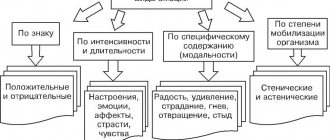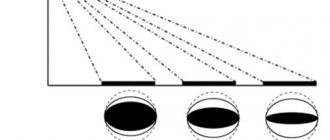Greetings, friends!
In political science, despotism is one of the worst forms of government, in which all power is concentrated in the hands of one person who does not recognize any laws other than his own. But today we will talk not about political, but about family despotism. It can also be called, without exaggeration, one of the worst forms of relationships. In this case, both a man and a woman can act as a despot. In this article we will look in detail at who a despot is, what signs characterize him and how to resist him.
Who is a despot?
A despot is a person who does not recognize that others are right and achieves his goals through pressure and violence. He does not need evidence or arguments; he believes that he is right in any situation. Even in relationships with the closest and dearest people, he constantly resorts to violence, humiliation, revenge, mental pressure, gaslighting (what is this?) and other aggressive methods of influence.
X The only thing about despotism is that it is almost always directed at people whom the despot considers dear and important to himself. He himself often does not notice how cruel he can be.
A despot is a tyrant who imposes his will on others through force, influence and power. A boss can be a despot, but it is much worse when one of the family members turns out to be one. Psychology considers the theory that despotism is a natural human instinct that awakens under a certain set of circumstances. According to this theory, the desire to rule is present in each of us, but it manifests itself to varying degrees in everyone.
Psychologists identify three main components of despotism:
- complete indifference to other people's feelings and opinions;
- the desire to completely control another person;
- the requirement of complete and constant self-obedience.
Despotism is capable of destroying any relationship, since a despot strives to completely deprive a partner of all rights, but allows himself almost everything. This happens in both love and friendship relationships.
Efremova's Dictionary
despotic
- adj. Based on despotism (1).
- Not taking into account the desires and will of others; autocratic.
Add your meaningSuggest your own meaning for the word despotic
Meanings of words synonyms for the word despotic
Synonyms for despotic
- authoritarian
- athletic
- heroic
- domineering
- imperiously
- domineering
- power-hungry
- omnipotent
- omnipotent
- omnipotent
- despotic
- dictatorial
- imperative
- right
- autocratic
All synonyms for the word despotic
Rhyming words for despotic
- despot
- despotism
- despotic
- despotic
- despoticism
- despotic
- despotism
- despot
All words with the same root for the word despotic
Rhyming for the word despotic
More information about the word despotic
Sources used:
- https://ru.m.wiktionary.org/wiki/despotic
- https://www.xapaktep.net/vices/political/despotism/desc.php
- https://znachenie-slova.ru/despotic
How does despotism manifest itself?
The most common form of despotism is family despotism. It usually manifests itself in the form of physical abuse or psychological abuse. One of the partners tries to completely subjugate the other, putting pressure on him by any means available to him. A despotic person completely ignores other people's desires, rights, freedoms and boundaries of personal space. He perceives all family members as property, but he himself believes that he loves them.
As a rule, a despot is a very touchy and vindictive person who perceives his behavior as a way of restoring justice. Through his actions, he tries to punish the offending family member, and this helps him look better in his own eyes. Also, such behavior allows him to increase his own self-esteem and restore damaged self-esteem.
A despot always strives to subjugate those around him and force them to act according to his orders. Despite this, he does not know how to be a leader at all. Due to his aggressive position, he can force others to obey him, but cannot inspire respect in them. In addition, he is not able to resolve conflict situations; instead, he himself constantly provokes conflicts. Such behavior leads to the fact that over time the despot causes only fear, hostility and complete misunderstanding in those around him.
What is despotism
In psychology, despotism is behavior that includes such manifestations as imposing one’s will not by argument, but by force, displaying aggression, using revenge, humiliation, physical and sexual violence, and gaslighting. Typically, the causes of such behavior are childhood traumas, complexes and fears that a person tries to overcome in such a destructive way and gain confidence and integrity. The problem is that this behavior strategy does not contribute to the establishment of harmonious relationships where personal healing on deep levels is possible.
The greater the number of fears hidden inside the psyche of a despot, the more sophisticated his methods of control become and the greater the desire to control the freedom of others. Uncertainty and doubts about one’s own attractiveness are covered up by aggressiveness, which does not even give others the opportunity to choose.
Despotism in the family does not give its members a choice even in their own attitude; they are literally forced to love. Despotism often coexists with humiliation and vindictiveness, and if the humiliation of others has more or less obvious tendencies, since, thus, a person begins to look better in his own eyes, then revenge is born global and causeless, aimed at everyone and for no reason. The deep meaning of such revenge lies in the restoration of damaged self-esteem and respect.
Despite the position of power and the desire for respect and self-aggrandizement, despoticism excludes cooperation and respect for others. Over time, such an attitude, provoking constant quarrels and conflicts, destroys any significant and strong relationships, as well as the psyche of the participants in the contact. Instead of missing love and acceptance, the despot receives fear, hatred, revenge, misunderstanding, hostility and ultimately loneliness.
Despotism manifests itself as a personality trait in men and women, but has slight external differences in the choice of methods. Initially, it may seem that despotism is an exclusively male trait, just as when it comes to rape, everyone immediately sees the woman as the victim. However, women are also despotic in many ways, it just less often takes the form of physical violence. Women are capable of destroying a man morally through jealousy, blackmail, constant hysterics, threats of suicide, reproaches and humiliation of his dignity. The arsenal of moral torture is wider than physical, and the worst thing is that a despotic woman will not repent of what she did, because... her actions and words are guided not only by affect, but also by reason.
Despotism is also characteristic of older people and even children (the first manifestations of such tendencies are possible at the age of three and are provoked by the onset of a crisis period).
Signs of a despot
Even a superficial understanding of who a despot is is enough to come to the conclusion that it is better not to mess with him. However, it is not so easy to recognize him, since he usually begins to show the main features of his character only after getting close. By considering them in time, you can avoid a disastrous union. Therefore, always pay attention to the following characteristic behavioral features, which are almost always present in autocratic individuals:
1. The desire to control those for whom they are important
. Life experience teaches the despot that his character should be hidden, revealing it only after sufficient rapprochement. Therefore, first of all, pay attention to how a person behaves towards the people to whom he is dear.
2. Vindictiveness
. The inability to forgive is the most important feature of despotic individuals. Therefore, a person whose behavior is characterized by petty vindictiveness is likely to turn out to be a despot.
3. The desire to humiliate
. If it is common for a person to unreasonably insult and humiliate those who have been “substituted” (for example, through a crude joke), this is also a reason to be wary.
4. Flair for weak-willed people
. Despots accurately identify potential victims who are unable to resist moral and mental pressure.
5. Excessive jealousy
. All despots are owners; they simply do not know other forms of affection and love. Therefore, they are always betrayed by jealousy, which, as a rule, is senseless and causeless.
Meaning of the word despotic
Examples of the use of the word despotic in literature.
True, if the Empire was despotic, then the royal power, due to a natural reaction, had to necessarily become liberal, and the involuntary consequence of Waterloo, to the great regret of the victors, was a constitutional order.
The whole appearance of his powerful figure, who also rose from the throne, the angry facial expressions of his face turned in profile, to the right of us, pale with excitement and anger, his open mouth uttering a terrible sentence, the commanding gesture of his hands embody all the mercilessness of punitive despotic power.
He demanded, despotically ordered: to put an end to the whim once and for all, to stop scribbling paper and to devote oneself to what brings so many benefits in life - work in the field of enlightenment.
The narrowness and limitations of the social base on which the very experience of Herzen’s revolutionary activity was based both in the 30s, immediately after the defeat of the Decembrist movement, and in the 40s, deprived him of the opportunity to consider his biography in the broad plan of the struggle against the despotic autocratic regime. serfdom system.
Through the medium of a simple word, the active and creative spirit and will of man, namely man, who commands despotically, or monarchically, is, therefore, what the monotheist comes from, is the prototype of his fantasy, his imagination.
He arbitrarily deposed many bishops and generally acted despotically in the East, which, of course, could not attract the sympathy of his brothers.
Thus, the helots, sent to war by the despotic will of their leaders, whom they could not disobey since they used their waters and forests, usually received very meager food, were disgustingly dressed and almost unarmed.
Despotic power in the hands of the king, who all his life belonged to the ranks of minors, could not protect the state from anarchy.
Talking with the arrogant Safavid about Luristan bronze, Sasanian fabric, Parthian vases, or about the eternal bliss awaiting the faithful in paradise Mohammed, or about the duel between Rostem and the Chinese Khakan, Saakadze persistently studied the despotic, treacherous nature of the Shah.
Until now, nature has been either the all-powerful, despotic mother of infant humanity, or a foreign slave, a thing.
However, due to an amazing irregularity - one of those strange contrasts with which, as one famous geographer said, the Russian land is full - these original republics, enjoying such broad social and personal freedom, at the same time represent the most reliable bulwark, the strongest foundations of a despotic regime.
Then there was such an indeterminate dominion as Egypt, still nominally part of the Ottoman Empire, with its own monarch, the Khedive, but officially under almost despotic British rule.
Varvara Petrovna always, from childhood, treated her former boarding school friend despotically and, under the guise of friendship, almost with contempt.
The state is, on the one hand, like a tree that reaches its full growth, color and fruitfulness, obeying some mysterious, despotic command independent of us from the inner idea embedded in it.
Pyotr Ivanovich surrounded himself with preferenceists, fellow hunters, welcomed numerous guests, despotically burdening his wife with the hassle of providing meals, and quietly but mercilessly reprimanded him angrily for uncleaned glass in a lamp or a towel that was not served ironed.
Source: Maxim Moshkov library
Causes of despotism
From the point of view of modern psychology, despotism is not an innate feature, although it is embedded in our genes. It is formed throughout life, but the main prerequisites are laid in childhood. This is facilitated by factors such as:
- parents completely ignoring the child’s opinion;
- competition with brothers and sisters;
- instilling in the child that he is better and more talented than those around him;
- frequent humiliation from peers, as well as within the family;
- domestic violence in all forms.
Most often, a person’s despotism is a consequence of the fact that in childhood he either himself became a victim of physical violence or saw his father beat his mother. It is believed that a person who regularly observes violence unconsciously takes the side of the aggressor so as not to become a victim himself. Thus, an aggressive model of behavior is established in a child in childhood.
Totalitarian regime
The term “totalitarianism” (from the Latin totus - whole, whole, complete) was introduced into political circulation by the ideologist of Italian fascism G. Gentile at the beginning of the 20th century.
A totalitarian regime is characterized by absolute state control over all areas of public life, the complete subordination of a person to political power and the dominant ideology.
Main characteristics of a totalitarian political regime:
- the state strives for global dominance over all spheres of public life, for all-encompassing power;
- society is almost completely alienated from political power, but it does not realize this, because in the political consciousness the idea of “unity”, “fusion” of power and people is formed;
- monopoly state control over the economy, the media, culture, religion, etc., right down to personal life, to the motives of people’s actions;
- state power is formed in a bureaucratic way, through channels closed from society, surrounded by a “halo of secrecy” and inaccessible to control by the people;
- the dominant method of control becomes violence, coercion, terror;
- the dominance of one party, the actual merging of its professional apparatus with the state, the ban on opposition-minded forces;
- the rights and freedoms of man and citizen are of a declarative, formal nature, and there are no clear guarantees for their implementation;
- pluralism is actually eliminated;
- centralization of state power headed by the dictator and his entourage; lack of control of repressive government bodies by society, etc.
A fascist regime is a special kind of totalitarian regime, a kind of radical totalitarianism.
A totalitarian political regime of the fascist type is characterized by militant anti-democracy, racism and chauvinism. Fascism was based on the need for strong, merciless power, which rests on the general dominance of the authoritarian party, on the cult of the leader.
Characteristics of a male despot
A fairly common situation is when the husband and father turn out to be the despot in the family. Since the man is usually much stronger, such relationships are often accompanied by physical violence. In this case, the spouse often chooses the wrong tactics. She gives in to her husband in everything and tries in every possible way to please him, hoping that this way he will become kinder. Of course, this leads to the opposite effect, and such relationships cannot be called happy.
To understand who a despot is, it is important to take into account the fact that such a person himself often does not realize the despotic nature of his behavior. Imagine a situation: a husband loves his wife, never resorts to violence, tries to provide her with such conditions that she does not work, but sits at home and raises children. But if you dig deeper, it turns out that he is simply trying to deprive his wife of freedom and independence, completely subjugating her to himself. Even if a woman initially likes such a union, over time the dependence begins to irritate her, and her feelings for the once beloved man cool down.
Characteristics of a female despot
This option is also quite possible. At the same time, psychologists share the nature of female and male tyranny. Despotic men usually feel the need to suppress others for the sake of their own self-affirmation. Women resort to despotism, trying to adapt to environmental conditions and occupy a more advantageous position. That is, female despotism, unlike male despotism, is usually situational in nature.
The best example, perhaps, would be a woman who has held a leadership position in a male team for a long time. Often faced with a frivolous attitude or inappropriate flirting from men, she gradually changes her behavior pattern, becoming a cruel and domineering boss. It is interesting that for the family she still remains a loving wife and caring mother.
How to resist a despot?
A characteristic feature of despots is that they are not always aware of their own despotic behavior towards dear people. They think that by trying to keep a loved one close to them, they are demonstrating love and affection. Therefore, in relations with a despot, it is important to find ways to smooth out the “sharp corners.”
When a psychotherapist is faced with family despotism, he first of all tries to find out the reasons for the aggressive behavior of one of the spouses. Typically therapy includes steps such as:
- getting rid of the inferiority complex;
- increasing a person’s self-esteem through awareness of real advantages;
- search for abilities and talents necessary for self-affirmation;
- formation of a person’s respectful attitude towards himself;
- developing respect for others.
The listed steps allow a despotic person to learn to admit that he is wrong. And for this you need a respectful attitude towards yourself and others. When a person begins to understand that in certain situations the opinions of other people can be more accurate and important than his own, he gains the ability to conduct constructive dialogue.
Definition of political regime
A political regime is a set of methods and means through which political power is exercised. The concept includes:
- the degree of participation of citizens in government decision-making;
- the nature of the formation of political institutions;
- the scope of political freedoms;
- mobility of elites (closed or open);
- legal status of the individual.
The regime of government is the dynamic (changing) side of the political system. Based on the regime, the political climate develops and judgments arise regarding the nature of the organization of the political structure in the state.
Similar forms of government can give rise to different political regimes. Let's figure out what factors shape them.










